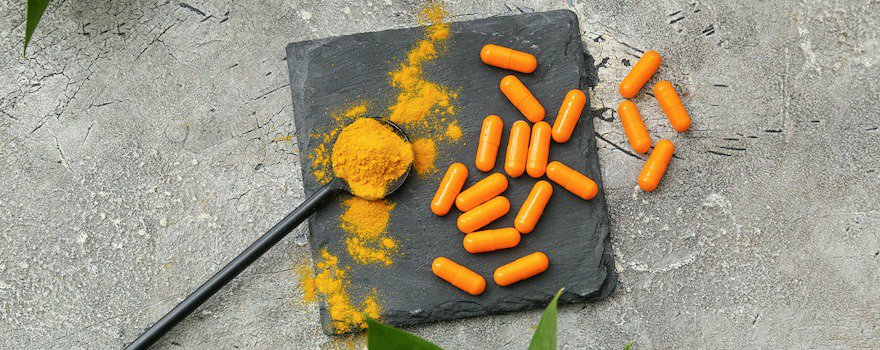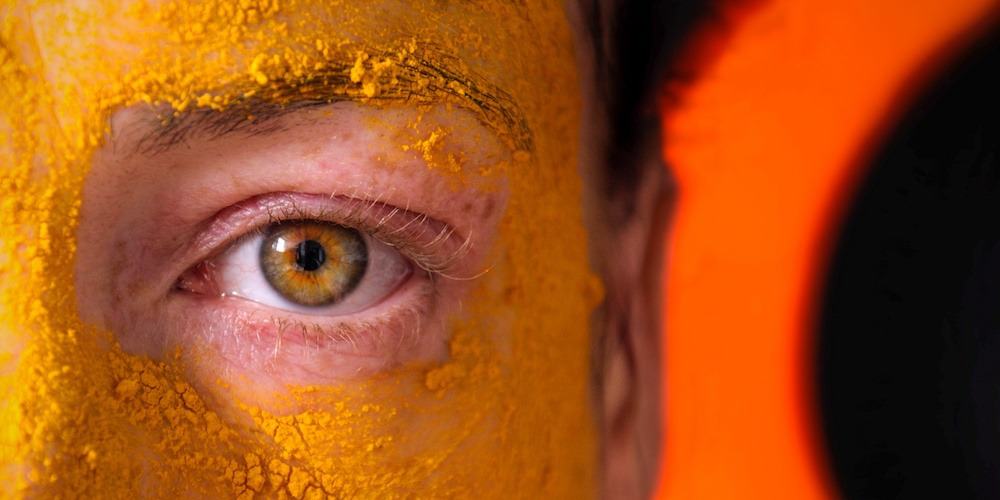What is turmeric ?
Turmeric is a plant cultivated for its rhizome. In cooking, it is eaten fresh or used in powdered form as a spice. It is also known for its medicinal properties, notably in traditional Ayurvedic medicine.
Its active ingredient is called curcumin. This yellow-orange pigment has anti-inflammatory, antioxidant and detoxifying properties.
It is also known to have beneficial effects on the nervous and cardiovascular systems.
Read also | How to choose the best curcumin ?
Turmeric is also beneficial for the skin. Indeed, it has healing, soothing, antibacterial, and anti-inflammatory properties. It can be taken as a dietary supplement or applied directly to the skin as a mask or poultice.

Its benefits for the skin
It removes toxins
Turmeric is one of the best foods for protecting and cleansing your liver. As shown by this study, it is an excellent natural detoxifier that helps eliminate toxins from the body: residues of heavy metals, pesticides…
Their accumulation promotes the appearance of imperfections (pimples, blackheads…) and skin conditions such as eczema or psoriasis. A dull, tired complexion can also be the reflection of a body overloaded with toxins.
By stimulating bile functions and bile production, turmeric helps cleanse, purify, and rid the liver of its toxins. It thus contributes to healthier, more beautiful skin.
It promotes healing
Other benefits of turmeric for the skin: curcumin supports and speeds up the wound healing process. Cuts, scrapes, burns, acne scars… Both uses (topical and internal) are beneficial.
It promotes skin regeneration and cell proliferation (development of new cells). In addition, it increases the synthesis of collagen in the wound area. Finally, it raises levels of superoxide dismutase (SOD). This antioxidant enzyme promotes wound healing and softens scar tissue.
In this study, wounds treated with curcumin (external use) healed much faster.
It soothes skin discomfort
Thanks to the soothing action of curcumin, turmeric reduces skin discomfort. Thus, it relieves irritations, itching, tightness and redness. Applied as a mask directly on the skin, it also soothes sunburns.
Turmeric also contains zinc (4.35 mg/100g) which calms itching and minor irritations of the skin and scalp.
This study shows that it improves symptoms of psoriasis such as itching and burning sensations.
It fights bacteria
As a natural antibacterial, it fights certain bacteria responsible for skin diseases such as Cutibacterium acnes. In this study, it showed significant effects in the treatment of psoriasis and acne.
Furthermore, curcumin has a bacteriostatic effect, meaning that it inhibits the proliferation and growth of bacteria.
It reduces skin inflammation
One last benefit of turmeric for the skin, and not least. Many dermatological conditions are linked to inflammation: acne, dermatitis, rosacea… Curcumin is able to regulate the inflammatory process and thus reduce skin inflammation. To do this, it inhibits the production of pro-inflammatory cytokines such as IL-6.
This study highlights the potential of curcumin in treating inflammatory skin diseases.

How to use turmeric for the skin?
As a dietary supplement
Turmeric as a dietary supplement is available as capsules, tablets, or powder.
Some products combine curcumin and piperine, derived from black pepper. As shown by this study, piperine allows better absorption of curcumin in the body (up to 20 times more). Other studies, however, show limited efficacy.
Choosing a curcumin/piperine supplement is therefore not mandatory but offers improved bioavailability.
Curcumin should also be in free form or bioactive.
Finally, choose a product with an adequate concentration of curcuminoids and curcumin, with a natural composition and no controversial excipients.
Also read | The best supplements for the skin according to a pharmacist
For external use
For external use, turmeric makes an excellent natural beauty treatment. Fresh rhizome and the powder can be used to prepare homemade masks and poultices.
You can, for example, make an anti-acne turmeric mask by mixing:
- 1 teaspoon of turmeric powder
- 1 teaspoon of yogurt
- ½ teaspoon of lemon juice
Mix all the ingredients until you obtain a homogeneous preparation. Apply to the face and neck, leave on for about 20 minutes, then rinse.
To avoid possible skin reactions, perform a test on the inside of the elbow before applying the mask.



